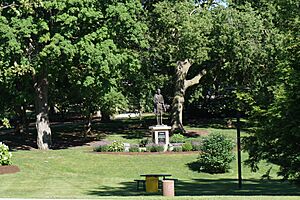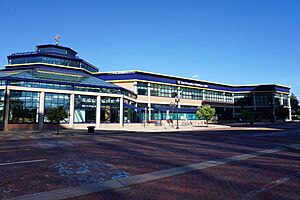University of Michigan–Flint facts for kids
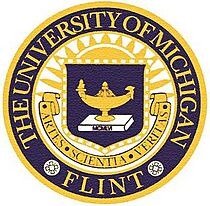 |
|
|
Former names
|
Flint Senior College of the University of Michigan (1956–1964) Flint College of the University of Michigan (1964–1971) |
|---|---|
| Motto | Artes, Scientia, Veritas |
|
Motto in English
|
Arts, Knowledge, Truth |
| Type | Public |
| Established | 1956 |
|
Parent institution
|
University of Michigan Board of Regents |
| Accreditation | HLC |
|
Academic affiliation
|
CUMU |
| Endowment | $150 million (2021) |
| Budget | $142 million (2022-23) |
| Chancellor | Laurence B. Alexander |
| President | Domenico Grasso (interim) |
| Provost | Yener Kandogan (interim) |
|
Academic staff
|
568 |
|
Administrative staff
|
526 |
| Students | 6,418 |
| Undergraduates | 4,995 |
| Postgraduates | 1,423 |
| Location |
,
U.S.
43°01′07″N 83°41′19″W / 43.0185°N 83.6887°W |
| Campus | Urban |
| Newspaper | The Michigan Times |
| Colors | Maize and blue |
| Nickname |
|
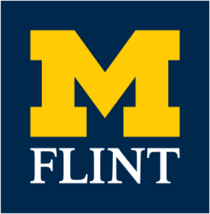 |
|
The University of Michigan–Flint (or UM-Flint) is a public university located in Flint, Michigan, USA. It started in 1956 as the Flint Senior College. At first, it was a branch of the University of Michigan, offering classes for older students. Over time, it grew into a full university and became officially recognized in 1970. Its name then changed to the University of Michigan–Flint. It still follows the rules set by the University of Michigan Board of Regents.
UM-Flint is one of five universities in Michigan that offer doctoral degrees. It is also part of the Coalition of Urban and Metropolitan Universities (CUMU). Other Michigan universities in CUMU include Oakland University, the University of Michigan–Dearborn, and Wayne State University.
Students at UM-Flint play in club and intramural sports as the Michigan-Flint Wolverines. Some famous people who went to UM-Flint include former Best Buy executive Shari Ballard, former US Senator Donald Riegle, and Oscar-winning film director Michael Moore. Michael Moore was even an editor for the student newspaper, The Michigan Times.
Contents
University History
Early Years (1956–1964)
The idea for a university in Flint came from former Flint mayor C.S. Mott in 1946. He talked with the University of Michigan president, Alexander Ruthven. Mott promised to donate $1 million if voters approved a $7 million bond. The University of Michigan first said no to the idea. But they later agreed to create the Flint Senior College of the University of Michigan. This college was an extension of the existing Flint Junior College (now Mott Community College).
The Flint Senior College was founded in 1956. It was not the first branch of the University of Michigan. The University of Michigan, started in 1817, had opened other branches before. These branches were in places like Pontiac, Kalamazoo, and Detroit. The university hoped these branches would become independent colleges later on.
For many years, the college shared the Court Street campus with Flint Junior College. This campus was part of the Flint Cultural Center. Many Flint business leaders, like C.S. Mott and William Ballenger, gave money for it. The first building, The Ballenger Field House, was built in 1954.
In February 1956, David M. French became the first dean of the Flint Senior College. Classes began that year with 118 full-time and 49 part-time students. Students could study liberal arts, sciences, education, and business. The first class graduated in 1958.
Becoming a Four-Year College (1964–1971)
In 1964, the college became a four-year school. It welcomed its first freshman class the next year. Its name changed to Flint College of the University of Michigan.
University of Michigan–Flint Today (1971–Present)
In 1970, Flint College received its own official recognition. This meant it was independent from the main campus in Ann Arbor. In 1971, the university's leaders officially changed the name to the University of Michigan-Flint. William E. Moran was named the first chancellor. In 1975, two main schools were created: the College of Arts and Sciences and the School of Management.
The community and city helped UM–Flint get 42 acres of land along the Flint River. In 1972, the C.S. Mott Foundation promised $5 million for a new campus. In September 1972, sixteen temporary buildings were put up to help with crowded classes. This encouraged the university leaders to move UM-Flint to its current spot by the Flint River.
On September 1, 1973, plans for the first new building were approved. It was built on the Flint River site, which is the current campus. The university also got the Ross House and the Hubbard Building. The groundbreaking ceremony was held on May 9, 1974. In 1977, the Class Room Office Building (CROB) was finished. It was later named David M. French Hall and included a library and theater. In 1979, the Harding Mott University Center (UCen) was completed, and the Recreation Center followed in 1982.
The William S. Murchie Science Building was finished in 1988. In 1991, UM-Flint took over the Water Street Pavilion, turning it into the University Pavilion. It kept restaurants and added administrative offices. The library moved to its own building, the Frances Willson Thompson Library, in 1994. In 1997, the university acquired 25 acres across the river. The Northbank Center was acquired in 1998.
In 1989, the School of Health Professions and Studies was formed. It was renamed the College of Health Sciences in 2018. The School of Education and Human Services was created in 1997.
Leaders of the University (1999-Present)
Juan E. Mestas became the fifth chancellor of UM-Flint in September 1999. The William S. White Building was finished in 2002. It was built on the north side of the Flint River for the School of Health Professions and Studies and the School of Management.
Ruth Person became chancellor in 2008. The first dorms on campus, First Street Residence Hall, opened in 2008. In 2010, UM-Flint was the fastest-growing public university in Michigan.
In August 2014, Susan E. Borrego became chancellor. In October 2015, the university bought the 10-story north tower of the Citizens Banking Buildings. In December 2015, the Riverfront Residence Hall was donated to the university. In October 2016, the School of Nursing was formed.
In July 2019, Debasish Dutta became the ninth chancellor.
How the University Works
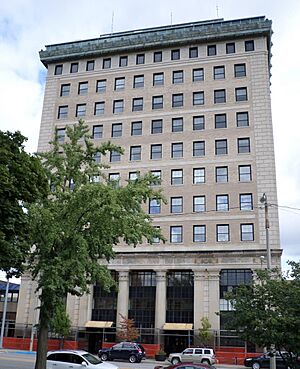
Leadership
UM–Flint is part of the University of Michigan. It has been guided by the Board of Regents of the University of Michigan since 1970. The Board of Regents chooses the university president. The president then suggests a chancellor, who manages the university's daily activities.
List of Chancellors
- William E. Moran (1971 – 1979)
- Conny E. Nelson (1980-1984)
- Clinton B. Jones (1984-1994)
- Charlie Nelms (1994-1999)
- Juan E. Mestas (September 1999 – July 2007)
- Ruth Person (August 2008 – July 2014)
- Susan E. Borrego (August 2014 – July 2019)
- Debasish Dutta (August 2019 – September 2023)
- Donna Fry (Interim) (August 2023 – June 2024)
- Laurence B. Alexander (July 2024 - present)
Faculty Involvement
The teachers at UM-Flint have a say in how the university is run. They have groups like the Faculty Congress and Faculty Senate.
Money Matters
The university's budget for 2022–23 was about $141.7 million. Most of this money comes from student tuition and fees, which was $90.8 million. The State of Michigan also gave $25.2 million to the university.
Schools and Colleges
UM-Flint has several schools and colleges. These include:
- College of Arts and Sciences (CAS)
- College of Health Sciences (CHS)
- School of Education & Human Services (SEHS)
- School of Management (SOM)
- School of Nursing (SON)
- College of Innovation and Technology (CIT)
| College/school | Year founded |
Enrollment (FA 2023) |
General Fund Budget ($, 2022-23) |
Budget per student ($, 2022-23) |
||||||
|---|---|---|---|---|---|---|---|---|---|---|
| College of Arts and Sciences | 1955 | 2,003 | 19,449,668 | 9,710 | ||||||
| College of Health Sciences | 1982 | 1,011 | 13,721,397 | 13,572 | ||||||
| College of Innovation and Technology | 2021 | 938 | 4,266,440 | 4,548 | ||||||
| School of Education and Human Services | 1997 | – | 3,981,685 | – | ||||||
| School of Management | 1975 | 967 | 6,867,344 | 7,102 | ||||||
| School of Nursing | 2016 | 1,142 | 8,630,659 | 7,557 | ||||||
| University of Michigan–Flint* | – | 6,130 | 116,515,400 | 19,007 | *included other standalone units | |||||
Academics and Programs
Becoming a Student
U.S. News & World Report said in 2022 that UM-Flint is "more selective" for admissions. For the class that started in fall 2021, UM-Flint received 4,021 applications and accepted 2,970 students (73.9%). Out of those accepted, 495 chose to enroll.
The students who started in 2021 had SAT scores mostly between 1020 and 1250. Their ACT scores were mostly between 21 and 29.
| First-time fall freshman statistics of the University of Michigan–Flint | |||||||||
|---|---|---|---|---|---|---|---|---|---|
| 2023 | 2022 | 2021 | 2020 | 2019 | |||||
| Applicants | 11,553 | 6,140 | 4,021 | 4,017 | 4,254 | ||||
| Admits | 3,415 | 4,074 | 2,970 | 3,110 | 2,806 | ||||
| Admit rate | 29.5 | 66.4 | 73.9 | 77.4 | 66.0 | ||||
| Enrolled | 533 | 521 | 495 | 559 | 604 | ||||
| Yield rate | 15.6 | 12.8 | 16.7 | 18.0 | 21.5 | ||||
| SAT composite* (out of 1600) |
950-1210 (64%†) |
948-1200 (62%†) |
1020-1250 (65%†) |
970-1200 (92%†) |
970-1210 (91%†) |
||||
| ACT composite* (out of 36) |
17-29 (3%†) |
20.5-28 (6%†) |
21-29 (7%†) |
19-26 (13%†) |
20-26 (17%†) |
||||
| * middle 50% range † percentage of first-time freshmen who chose to submit |
|||||||||
Graduation and Staying in School
About 70% of freshmen at UM-Flint continue their studies after their first year. About 35% of students graduate within six years. The eight-year graduation rate is 49%.
What You Can Study
UM-Flint offers 138 different majors for Bachelor's degrees. It also has 43 graduate majors, including Master's and Ph.D. degrees. The most popular majors in 2021 were nursing, psychology, health administration, and accounting. The university also offers an engineering degree in mechanical engineering.
University Rankings
| USNWR National University | 390 |
|---|---|
| Washington Monthly National University | 273 |
| Top Performers on Social Mobility | 207 |
| Engineering (no doctorate) | 138 |
| Nursing-Anesthesia | 22 |
| Online Master's in Nursing | 53 |
| Physical Therapy | 53 |
| Best Public Affairs Program | 216 |
| Part-time MBA | 127 |
UM-Flint is officially recognized by the Higher Learning Commission (HLC). Many of its programs also have special accreditations. The Princeton Review has included UM-Flint in its "Best Midwestern" colleges list.
Job Outcomes
The US Department of Education reported that students who received federal aid at UM-Flint earned a median annual income of $53,230 ten years after starting their studies. This is higher than the average personal income in the US.
Some of the highest-earning fields of study for students at UM-Flint include:
- Nursing (Master's Degree)
- Business Administration (Master's Degree)
- Computer Science (Bachelor's Degree)
- Mechanical Engineering (Bachelor's Degree)
Student Life
Living on Campus
In 2004, the university decided to look into building student housing. The first dorm, First Street Residence Hall, opened in fall 2008. In December 2015, the Riverfront Residence Hall was given to the university. This 16-story building can house up to 500 students.
Student Groups
There are over 100 student organizations at UM-Flint. These groups cover many interests, like academics, religions, cultures, and sports. Some official university-sponsored groups include:
- The Michigan Times, the student newspaper.
- Black Student Union
- Campus Activities Board
- Student Government
Greek Life
The university has several fraternities and sororities:
|
Sororities:
|
Fraternities:
|
Radio Station
The university owns WFUM (91.1 FM), a public radio station that is part of the Michigan Radio network.
Student Newspaper
The Michigan Times was the student-run newspaper at UM-Flint. It started in 1959. Famous former staff members include filmmaker Michael Moore and singer LaKisha Jones. The newspaper was printed weekly and given out for free. In March 2024, it was reported that The Michigan Times would stop publishing due to a lack of student interest and funding.
Student Government
The University of Michigan–Flint Student Government represents the students. It also manages student funds on campus.
Athletics
The university's sports teams are called the Wolverines. An unofficial student vote in 2009 chose "The Victors" as a nickname to avoid confusion with the main Michigan Wolverines teams.
UM-Flint does not have varsity intercollegiate athletics. However, it offers many club sports and intramural sports leagues. Current Club Sports include:
- Men's & Women's Basketball
- Cheer
- Men's Ice Hockey
- Men's & Women's Soccer
- Women's Volleyball
- Softball
In 2013, the men's ice hockey team made it to the ACHA Division III National Championship Game. In 2015, the women's hockey team had a great season, winning 18 games and losing none in conference play.
Notable People
Many notable people have studied or worked at UM-Flint, including:
- Jim Ananich – Michigan Senate minority leader
- John D. Cherry – former Lieutenant Governor of Michigan
- Christopher Paul Curtis (2000) – writer and Newbery Medal winner
- Erin Darke – actress
- Mona Haydar – rapper, poet, activist
- LaKisha Jones – singer, American Idol contestant
- Michael Moore – documentary film director, author
- Don Riegle (1960) – former US Senator from Michigan
- Marietta S. Robinson – former commissioner of the US Consumer Product Safety Commission
- John Sinclair (1964) – poet, political activist
- Rob Paulsen - voice-over artist
 | John T. Biggers |
 | Thomas Blackshear |
 | Mark Bradford |
 | Beverly Buchanan |


